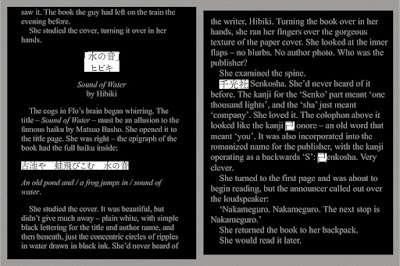Borrowed Nick Bradley's 'Four Seasons in Japan' (2023). It was absolutely meta, a fictional story of fictional story. A book within a book. I end up needing no more affirmation that the answer to life's new paths is found in books, in reading them.
I also loved that the author (currently teaching the Masters class in Creative Writing at University of Cambridge and MA at UEA) delved into a PhD on the figure of a cat in Japanese literature. He speaks Japanese fluently, and has also worked as a translator for several books. But I haven't read his first book 'The Cat and the City' (2020).
Oregon-born and now living in Japan protagonist Flo Dunthorpe works as a translator. She's got ennui; she's sick and tired of Tokyo, stuck in a rut with her job and disillusioned with a relationship that seems to have run its course (partly her own fault), with her partner Yumi going off to New York City. Of course they have a cat named Lily. The cat lives with Flo and isn't going anywhere, till one day Lily disappeared from the apartment .
One day in the subway, she picks up a book left by a fellow passenger. It's titled 'The Sound of Water' written by Hibiki in Japanese. As Flo reads it and endeavors to translate it to English, she gets caught up in the lives and emotions of the protagonists and thought about how much her own life parallels theirs. It's an absolute hoot — a book within a book, and a translation within.
The subway book talks about a grandmother Ayako and her grandson Kyo living in Onomichi after a family tragedy (his father died by suicide). Kyo's mother thought he should be with his grandmother. A mundane but steady life running a coffeeshop versus dreams of being an artist or to keep trying to pass the exams to medical school. Ahhhh, ageing and youthful dreams.
'The Sound of Water' divided its chapters into the four seasons. We see Flo working on it through the seasons too, and there seems to be progress as she works on it bit by bit, section by section, concentrating on getting it right and getting sufficient material to send to her publisher to see if they're keen to publish it in English.
One of the dangers of literary translation work was falling down research rabbit holes. Whether it was googling a tonbi coat to see what kind of overcoat Ayako was wearing (she'd seen online that it looked a bit like Sherlock Holmes's coat), or working out how to weave into the text that Japanese of the older generations put cloth covers over their landline phones (she still felt she'd done that poorly), she'd keep falling down on a single sentence and it would suck an hour from her morning.
Flo had visited the reclusive author Hibiki who lives in Onomichi. That was a pen name. Hibiki is a manga illustrator who wrote this book for fun. This meeting happened because Hibiki's partner Henrik Olafssen contacted Flo. She also met their cat Coltrane. She got permission from Hibiki to translate the book, and his blessing to send it across the world, but he would remain private.
We readers are treated to this translated book within a book, and the whole novel ended with a 'Translator's Afterword'. Flo's. We see that she has gotten over the hump and ennui, and it meant everything to her to get this translated and published. She found her mojo again and gained new inspiration and insights. She has learnt that not to push her friends away and being more open with her emotions with those who genuinely care for her.
'Please, Flo-san,' he says, 'by all means, translate the book into English. You have my blessing. I myself have no interest in what happens to it, but I can see that it's important to you. That's what really matters — who am I to stand in the way of your dreams?'
I bow, and thank him profusely. We say our farewells, and just as he is about to leave the room, he pauses, as though something important has occurred to him. 'But if you do translate this book, Flo, you must promise me one thing.'
'What's that?'
'You must promise to make it your own.' He looks me straight in the eyes. 'Put something of yourself in it. So the readers get a sense of you.'
'I promise,' I say, bowing.
He turns to look at Coltrane, curly up on the floor of the tatami. His feet are twitching as he dreams. 'Oh, to be a cat,' he says. 'They dream, but they don't let their dreams consume them. That's the thing about humans — we feel like we have to make our dreams real. And that's what causes us such joy and discontent.'
There's a proverb used in this book: 「山あり谷あり」, literally 'there're mountains and there're valleys'. It's pretty much a reminder to us that there're ups and downs in life. We can only manage our own attitude towards our own lives and take control whenever we could, and leave it up to God when we can't.


No comments:
Post a Comment